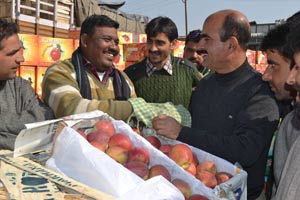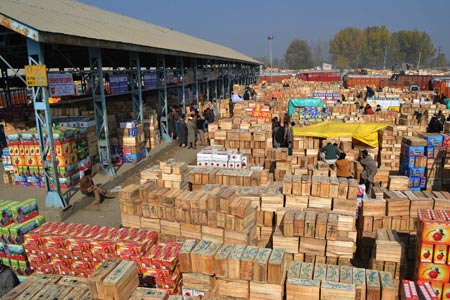RISING FREIGHT RATES
Zafar Sobhan, a trader from Bangladesh, feels that Sopore Mandi has potential to attract huge number of foreign buyers if only local government is willing to provide them with adequate facilities. “We are not asking anything for free,” he said, “But the government should make sure that there is enough transport available to traders. It will also help in checking the unnecessary rise in freight rates.”

According to Shoban, freight rates increase manifold because of non-availability of transport locally. “The state government should arrange transport from other states during peak trading season,” he said. Traders are usually dependent on transporters from neighboring states like Punjab and Haryana but even that is not enough to check the price fluctuations.
People associated with the trade have been asking the government to persuade transporters from Punjab and Haryana to dispatch more vehicles to Kashmir during trading season. “The increase in the freight rates started since September. The transporters used to charge between Rs 90 and 95 per box as freight to Kolkata,” said Ghulam Nabi Sheikh, a local trader. “Increased freight charges ultimately mean less profit to the growers,” said Malik.
When the demand for the apples increased, about 350 trucks loads of fruit would leave daily for different fruit markets across India including the biggest Azadpur Mandi in Delhi. But on any given day, not more than 150 trucks are available in the Mandi, giving transporters liberty to set freight charges themselves.
“I could have bought more produce this year but high transportation charges will eat into my profits,” says Sobhan. In the last season, Sopore Mandi dispatched around 30,000 fruit-laden trucks to different markets across India and abroad. This year the figure has already crossed 20,000.
“Kashmiri apples have huge demand in markets outside India. Whatever we take from here is sold within days. I could have bought more from Kashmir as there is demand back home but transpiration charges are too high,” said a trader from Nepal. At the beginning of the trading season, prices were not as high as they are now. The rates are usually low in first three months of trading i.e. July, August and September. But in last week of September the rates start appreciating.
BRINGING INNOVATIONS
On the other hand traders say that they have to sell their produce at cheaper rates as there is no cold storage facility available in the area. “We have no alternative than to sell our fruit instantly as we don’t have storage facility here,” said Ghulam Mohmmad Khan, a local grower.
Because of lack of adequate storage facilities, farmers often end up selling their produce at lower prices. “The available cold storage space is too costly. It only adds to the price,” said Khan. “Due to high storage costs only big traders can afford to use storage facilities.” Small growers like Khan pray for a stable market as it helps them sell their produce at desired rates and within time.

The traders feel the introduction of cardboard boxes as a packaging alternative has helped them in overcoming the monopoly of local wooden box manufactures. Despite easy availability of cardboard boxes and its cost effectiveness, a large number of traders still prefer wooden boxes. While a wooden box costs between Rs 40 and 50, the cardboard, which is light and attractive, costs between Rs 20 and 25 only. Despite its high cost, traders who come from outside India prefer wooden boxes as they are solid and can survive long and bumpy rides across the borders. On the other hand, local traders feel the introduction of cardboard boxes has helped in checking the rates of the wooden boxes to an extent. Earlier, wooden box manufactures’ used to call shots and decide prices without a care for the apple produce or market. But now, things have changed and after cardboard boxes were introduced, they too have slashed their prices.
“Because of its price, cardboard boxes are used to transport both grade 2 and grader 3 apples,” says Ghulam Nabi Sheikh, a Baramulla based forwarding agent.
SHRINKING SPACE
However, the Mandi faces acute infrastructural problems. The costs for the upgradation of facilities at Mandi were Rs 33.89 crore but only Rs 13.41 crore has been utilized so far. At present, the Mandi has 12 auction platforms and only 240 growers can auction the fruit at these sites while the number of growers is more than 900. The minimum requirement is of 35 platforms.
The traders are unable to construct shop-cum-offices due to ‘delay in allotment and procedural hassles.’ “In 1999, the government asked us to deposit money in installments for 600 shops and allotment was not done for more than 10 years. We have already paid more than Rs 6 crore towards government but now we are being asked to pay entire amount before entering into lease deed with the government for constructing shops,” Malik says.
The horticulture department, according to Malik, collected between Rs 70 and 80 lakh rupees as entry fee to the Mandi from vehicles in 2011. But no one knows where the money has gone. This money, Malik says, was supposed to be spent for the development of fruit Mandi. But no development has taken place.
















The copy us good but misleads a reader. Initially it offers one figure of the expenditure booked by the givernment and in the concluding aras the figure changes. What us the correct figure, please?